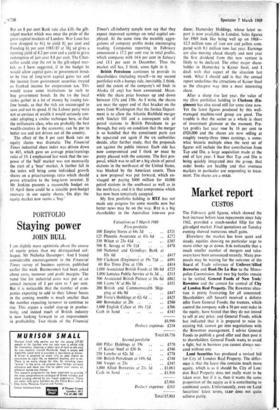Staying power
PORTFOLIO JOHN BULL
I am slightly more optimistic about the course of equity prices than my distinguished col- league, Mr Nicholas Davenport. And I found considerable encouragement in the Financial Times survey of business opinion, published earlier this week. Businessmen had been asked about costs, turnover and profit margins. The trend line for industrial costs was put at an annual increase of 3 per cent to 5 per cent. But it is noticeable that the number of com- panies expecting to add to their labour forces in the coming months is much smaller than the number expecting turnover to continue to rise. This argues a useful step-up in produc- tivity, and indeed much of British industry is now looking forward to an improvement in profitability. Two thirds of the Financial Times's all-industry sample now say that they expect improved earnings on total capital em- ployed. At the same time the monthly, aggre- gations of company profits make encouraging reading. Companies reporting in February announced a 17.2 per cent rise in total profits, which compares with 14.6 per cent in January and 13.1 per cent in December. Thus the market still has, 1 think, some fight in it.
British Petroleum continues to provide its shareholders (including myself—in my second portfolio) with a bumpy ride, inevitable, I think, until the extent of the company's oil finds in Alaska (if any) has been announced. Mean- while the share price bounces up and down between 135s and 150s. As I write, the shares are near the upper end of that bracket on the news from Washington that the Justice Depart- ment is to allow the Atlantic Richfield merger with Sinclair Oil and a consequent sale of petrol stations to British Petroleum to go through, but only on condition that the merger is so handled that the constituent parts can be separated out again if the us authorities decide, after further study, that the proposals are against the public interest. Each side has now compromised and I think BP must be pretty pleased with the outcome. The first pro- posal, which was to sell BP a big chain of petrol stations in the north-east of the United States, was blocked by the American courts. Then a new proposal was put forward, which en- visaged BP paying $400 million for 10,000 petrol stations in the south-east as well as in the north-east, and it is that compromise which has now been tentatively accepted.
My first portfolio holding in RTZ has not made any progress for some months now but better news may be on the way. R-rz is a big shareholder in the Australian iron-ore pro-
Valuations at 5 March 1969 First portfolio 100 Empire Stores at 64s 3d £321 125 Phoenix Assurance at 43s 6d .. £272 330 Witan at 23s 4fd £385 500 E. Scragg at 19s 14d £478 100 National and Grindlays Bank at 83s 6d £417 500 Clarkson (Engineers) at 19s 71d .. £491 60 Rio Tinto Zinc at 138s £414 1,000 Associated British Foods at lOs 6d £525 1,000 Jamaica Public Service at 6s 3d .. £313 500 Associated British Picture at 34s 6d £862 100 Lyons 'A' at 86s 3d £431 200 British and Commonwealth Ship- ping at 44s 9d £447 200 Forte's Holdings at 42s 6d £425 400 Bowmaker at 28s £560 1,000 English Calico at lOs ljd £506 Cash in hand .. £143 £6,990 • Deduct: expenses £234 Total £6,756 Second portfolio 600 Pillar lifoldings at 19s ..
15 Kaiser Steel at £36 8s ..
250 Lonrho at 62s 3d 100 British Petroleum at 149s 6d 300 Vosper at 23s 1,000 Allied Breweries at 21s 3d Cash in hand £5,966 Deduct: expenses £163 Total £5,803 .. £570 .. £546 .. £778 .. £748 .. £345 .. £1,063 .. £1,916
ducer, Hamersley Holdings, whose latest re- port is now available in London. Sales figures for-1969 look like being well up on 1968- 12.5 million tons of iron -ore and pellets com- pared with 9.1 million tons last year. Earnings are also moving ahead sharply and next year the first dividend from this new venture is likely to be declared. The other major share- holder in Hamersley is Kaiser Steel, and I dealt with that aspect of the situation last week. What I should add is that the annual report underlines the attractions of Kaiser Steel as the cheapest way into a most interesting share.
After a sharp rise last year, the -value of my (first portfolio) holding in Clarkson (En- gineers) has also stood still for some time now. Yet the latest figures produced by this well- managed machine-tool group are good. The trouble is that the sector as a whole is short of investment glamour at the moment_ Pre- tax profits last year rose by 16 per cent to £926,000 and the shares are now selling at roughly twenty-three times earnings, a some- what historic multiple since the next set of figures will include the first contribution from Tap and Die, a large acquisition made at the end of last year. I hear that Tap and Die is being quickly integrated into the group, that order books are healthy and that overseas markets in particular are responding to treat- ment. The shares are a MID.


































 Previous page
Previous page